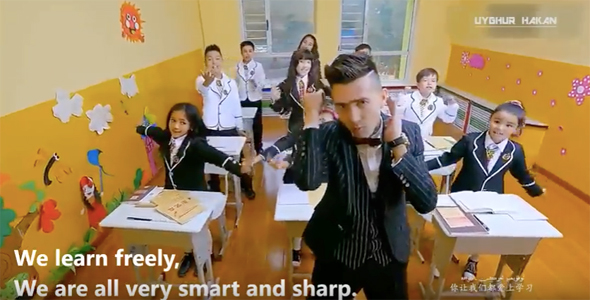he following article was written and researched by Rachel Harris, teacher of ethnomusicology at SOAS, University of London, and leader of the Leverhulme research project, Sounding Islam in China; and Aziz Isa Elkun, London-based Uyghur writer and blogger actively engaged in promoting Uyghur culture and history. The views expressed and research presented in this blog are those of the writers and not of Freemuse.
The Xinjiang (East Turkistan) Uyghur Autonomous Region of China is currently undergoing a wave of oppression, largely shielded from the outside world. Ostensibly aiming to ‘crack down on Islamic extremism’, the Xinjiang (East Turkistan) government has imposed sweeping restrictions on freedom of expression, movement and association, enforced by invasive surveillance, arrests and executions.
Since 2017, it has become clear that the campaign is indiscriminately targeting the entire Uyghur population. Hundreds of thousands of people have been detained in the ‘rehabilitation centres’ that have sprung up across the region. They include many prominent Uyghur writers, academics and musicians.
As the campaign gathers in severity, another prominent Uyghur musician, Ablajan Awut Ayup, has disappeared.
Coming to fame during a period of growing political tension and rising Islamic piety, Ablajan faced problems on all sides. He was disliked by religious conservatives for his bi-lingual songs, his less than macho image and for agreeing to appear in state ‘anti-extremism’ propaganda. He was interviewed by the BBC in 2017 and portrayed as a model of integration, an artist who could reach out to Uyghur and Chinese audiences and build bridges.
Neither this, nor his fame and many awards at a national level, were sufficient to protect him from arbitrary detention. Ablajan disappeared in February, on his way home to Urumchi following a recording trip in Shanghai, reported the Financial Times on 21 March 2018.
No reason has been given for his detention, it is not known if he has been formally charged, and his family have been given no news of his whereabouts.
Promoting Uyghur culture
According to US-based Uyghur researcher Tahir Imin, the reason for Ablajan’s detention was simply that he “promoted Uyghur culture and identity, and he tried to protect a pure and healthy Uyghurness. He taught Uyghur culture to children, and encouraged them to use Uyghur language, and to love and be proud of Uyghur culture”.
“Our children are very clever,” Ablajan told the Xinjiang (East Turkistan) Arts Journal in 2017. “In this fast developing society we should give them a chance to follow fashion and incorporate our own traditions and music into it. If we create good music then they will follow us.”
In one of his most popular songs, Dear Teacher (Soyumlik Muellim), Ablajan plays the role of a schoolteacher in a classroom infinitely more glamorous than the one he originally taught in, promoting an ideal curriculum that included maths, science and Chinese, but which—controversially—was headed by a lesson in Uyghur language and literature.
Since Uyghur language school education has been phased out over the past ten years, and Uyghur children are now required to study in the Chinese language, this may have been enough to earn him the label of ‘two-faced intellectual’, a charge now being levelled at many Uyghur public figures whose commitment to their own culture is now equated to a lack of loyalty to the Chinese state, and an imprisonable offence.

Influential among children
Ablajan’s concern for Uyghur children’s development extended to charitable work. He visited sick children in hospital and publically befriended a young boy dying of liver cancer, which had a big social impact when the boy died in 2016.
“I think the government was afraid that he was too influential among children and he would get in the way of the assimilation project,” Imin said. “He was an obstacle to their goal of promoting Chinese language and culture among Uyghur children.”
A star on the rise
Born in 1984 in the rural south, in the impoverished Guma county of Khotan, Ablajan’s life is a remarkable rags to riches story. After training and working as a music teacher, he moved to Urumchi, studied in the Arts College, and began to cement his position in the Uyghur music industry, eventually establishing his own ‘Cultural Products Company’ and fashion label.
Eventually, Ablajan rose to fame in 2010. Best known for his Uyghur language songs for children, his videos blend homage to Michael Jackson with the disciplined dance moves of K-pop, a style that brought him huge popularity among Uyghur audiences and a host of awards, such as ‘Star of the Silk Road’, awarded by the Xinjiang (East Turkistan) Cultural Bureau in 2013.
His portfolio of songs includes the Uyghur language Are there Children Playing? (Oynaydighan Bala Barmu?) and the bi-lingual Sun, come out (Aptap Chiq). He collected traditional children’s songs and rhymes and made them into contemporary songs, like Taqqa Tuqqu, that caught the popular imagination.






